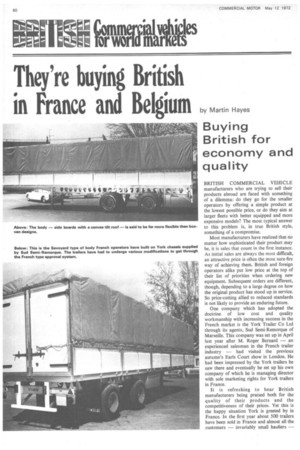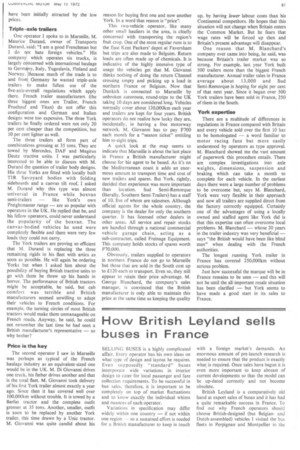fruniiallfes
Page 66

Page 67

If you've noticed an error in this article please click here to report it so we can fix it.
r worimarei
They're buying British
in France and Belgium by Martin Hayes
Buying British for economy and quality
BRITISH COMMERCIAL VEHICLE manufacturers who are trying to sell their products abroad are faced with something of a dilemma: do they go for the smaller operators by offering a simple product at the lowest possible price, or do they aim at larger fleets with better equipped and more expensive models? The most typical answer to this problem is, in true British style, something of a compromise.
Most manufacturers have realized that no matter how sophisticated their product may be, it is sales that count in the first instance. As initial sales are always the most difficult, an attractive price is often the most sure-fire way of achieving them. British and foreign operators alike put low price at the top of their list of priorities when ordering new equipment. Subsequent orders are different, though, depending to a large degree on how the original product has stood up in service. So price-cutting allied to reduced standards is not likely to provide an enduring future.
One company which has adopted the doctrine of low cost and quality workmanship with increasing success in the French market is the York Trailer Co Ltd through its agents, Sud Semi-Remorque of Marseille. This company was set up in April last year after M. Roger Bernard — an experienced salesman in the French trailer industry — had visited the previous autumn's Earls Court show in London. He had been impressed by the York trailers he saw there and eventually he set up his own company of which he is managing director with sole marketing rights for York trailers in France.
It is refreshing to hear British manufacturers being praised both for the quality of their products and the competitiveness of their prices. Yet this is the happy situation York is greeted by in France. In the first year about 500 trailers have been sold in France and almost all the customers — invariably small hauliers — have been initially attracted by the low prices.
Triple-axle trailers
One operator I spoke to in Marseille, M. Maurice Durand, owner of Transports Durand, said: "I am a good Frenchman but I do tot hate foreign vehicles." His company which operates six trucks, is largely c ncerned with international haulage to Germ ny, Italy, Yugoslavia, Finland and Norway. Because much of the trade is to and from Germany he wanted triple-axle trailers o make fullest use of the five-axle-overall regulations which apply there. French trailer manufacturers (the three biggest ones are Trailor, French Fruehauf and Titan) do not offer this configuration and German and Italian designs were too expensive. The three York trailers he finally ordered were not only 20 per cent cheaper than the competition, but 10 per cent lighter as well.
The three trailers all form part of combinations grossing at 35 tons. They are towed by Mercedes, DAF and Magirus Deutz tractive units. I was particularly interested to be able to discuss with M. Durand the question of trailer body designs. His three Yorks are fitted with locally built TIR Savoyard bodies with folding sideboards and a canvas tilt roof. I asked M. Durand why this type was almost universal in France while boxvan semi-trailers — like York's own Freightmaster range — are so popular with operators in the UK. He replied that he, and his fellow operators, could never understand the popularity of the boxvan. The canvas-bodied vehicles he used were completely flexible and there were very few loads they could not carry.
The York trailers are proving so efficient that M. Durand is replacing the three remaining rigids in his fleet with artics as soon as possible. He will again be ordering Yorks but when I asked him about the possibility of buying British tractive'units to go with them he threw up his hands in horror. The performance of British tractors might be acceptable, he said, but cab comfort was terrible and British manufacturers seemed unwilling to adapt their vehicles to French conditions. For example, the turning circles of most British tractors would make them unmanageable on French roads. Anyway, he said, he could not remember the last time he had seen a British manufacturer's representative — so why bother?
Price is the key The second operator I saw in Marseille was perhaps as typical of the French haulage industry as an equivalent-sized one would be in the UK. M. Di Giovanni drives one truck, his father drives another and that is the total fleet. M. Giovanni took delivery of his first York trailer almost exactly a year ago. Since then it has covered well over 100,000km without trouble. It is towed by a Berliet tractor and the complete outfit grosses at 35 tons. Another, smaller, outfit is soon to be replaced by another York trailer, this time drawn by a Unic tractor. M. Giovanni was quite candid about his reason for buying first one and now another York. In a word that reason is "price".
This two-vehicle operator, like many other small hauliers in the area, is chiefly concerned with transporting the region's fruit crop. One of the most regular runs is to the East Kent Packers' depot at Faversham but trips are also made to Belguim. Return loads are often made up of chemicals. It is indicative of the highly intensive type of usage the vehicles get that M. Giovanni thinks nothing of doing the return Channel crossing empty and picking up a load in northern France or Belgium. Now that Dunkirk is connected to Marseille by unbroken autoroute, round-trips to the UK taking 10 days are considered long. Vehicles normally cover about 120,000km each year and trailers are kept for four years. British operators do not realize how lucky they are, incidentally, in having a free motorway network. M. Giovanni has to pay F700 each month for a "season ticket" entitling him to eight trips.
A quick look at the map seems to indicate that Marseille is about the last place in France a British manufacturer might choose for his agent to be based. As it's on the Mediterranean coast it adds an enormous amount to transport time and cost of new trailers and spares. But York, rightly, decided that experience was more important than location. Sud Semi-Remorque (literally. Southern Semi-Trailers) has a staff of 10, five of whom are salesmen. Although official agents for the whole country, the company is the dealer for only the southern quarter. It has licensed other dealers in other areas. All service and repair stocks are handled through a national commercial vehicle garage chain, acting as a sub-contractor, called Freinage Equipment. This company holds stocks of spares worth F70,000.
Obviously, trailers supplied to operators in northern France do not go to Marseille but those that are sold in the South cost up to £120 each to transport. Even so, they still appear to retain their price advantage. M. George Blanchard, the company's sales manager, is convinced that the British manufacturer is only able to maintain this price at the same time as keeping the quality
up, by having lower labour costs than his Continental competitors. He hopes that this situation will not change when Britain enters the Common Market. But he fears that wage rates will be forced up then and Britain's present advantage will disappear.
One reason that M. Blanchard's company ever came into being, he said, was because Britain's trailer market was so strong. For example, last year York built 500 trailers more than the biggest French manufacturer. Annual trailer sales in France average about 13,000 and Sud Semi-Remorque is hoping for eight per cent of that next year. Since it began over 500 York trailers have been sold in France, 250 of them in the South.
York expertise There are a multitude of differences in regulations in France compared with Britain and every vehicle sold over the first 10 has to be homologated — a word familiar to motor racing fans but more easily understood by operators as type approval. M. Blanchard showed me the vast amount of paperwork this procedure entails. There are complex investigations into axle weights, dimensions, suspension and braking which can take a month to complete for each vehicle. In the earliest days there were a large number of problems to be overcome but, says M. Blanchard, York were very flexible in their approach and now all trailers are supplied direct from the factory correctly equipped. Certainly one of the advantages of using a locally owned and staffed agent like York did is that this expertise can often overcome local problems. M. Blanchard — whose 20 years in the trailer industry was very beneficial — says "the British would have been like blind men" when dealing with the French authorities.
The longest running York trailer in France has covered 250,000km without serious problem.
Just how successful the marque will be in France remains to be seen — and this will not be until the all-important resale situation has been clarified — but York seems to have made a good start in its sales to France.
















































































































































































































